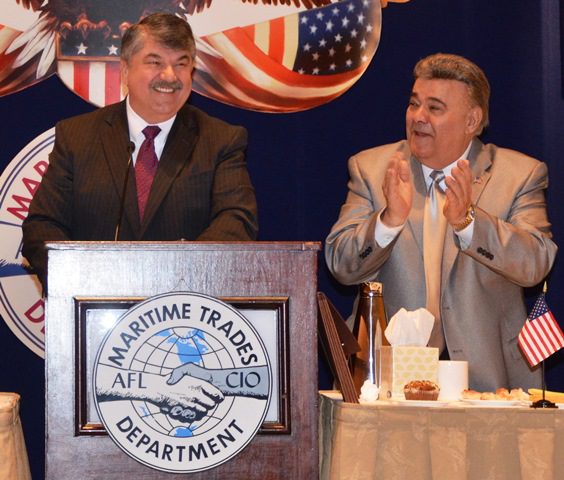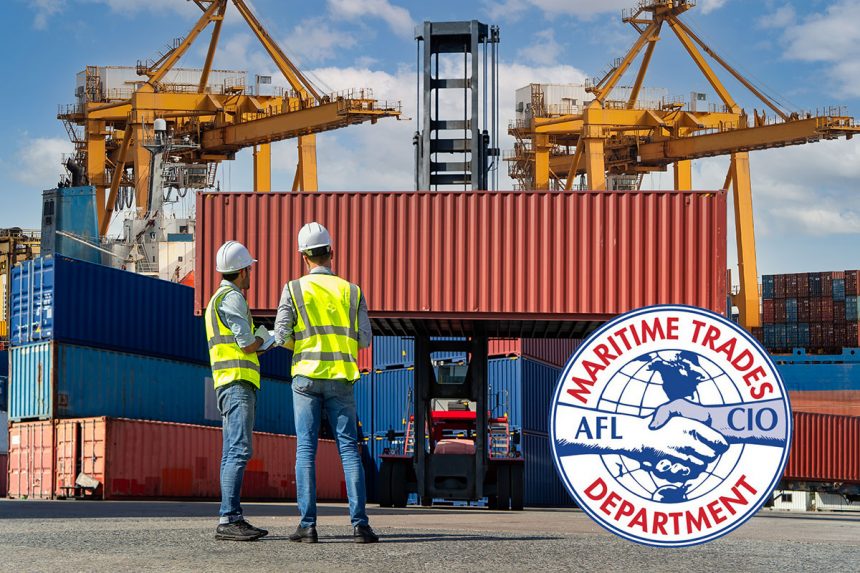
The blueprint for strengthening the labor movement isn’t simple and the task won’t be easy, but history and solidarity prove it can be done.
AFL-CIO President Richard Trumka, a longtime friend of the Maritime Trades Department, delivered that message Feb. 22 when he addressed the MTD executive board near Orlando, Fla.
“America’s labor unions and America’s working people are in a tough place. There will be no easy answers,” Trumka told the board. “But progress never comes easy. It never has and never will…. It’s up to us to make it happen. Working people want and need progress, and we’re not afraid to go the extra mile.”
Trumka called upon personal history – including cooperative experiences with MTD President Michael Sacco – as an inspiration for today’s labor movement. He recalled difficult times nearly 40 years ago, when Trumka was a United Mine Workers official (he later became the union’s president) assisting coal miners in Kentucky and Illinois while Sacco was organizing inland boatmen for his union, the MTD-affiliated Seafarers International Union.
“We sealed our friendship” at that time, Trumka noted, by supporting each other’s efforts. “Solidarity is a remarkable thing,” he continued. “You can’t put it on a scale to weigh it. You can’t measure it in board feet. It can seem contradictory: The harder it is to do, the more powerful it gets. And when it really gets rolling, solidarity – true solidarity – can come out the winner in any contest, and in the process it makes everybody stronger.
“Mike and I have been through a lot together. We know the meaning of true solidarity.”
The federation president said labor history is “instructive, and all of us can learn from the past. History helps us gain context for the present. And we can take those lessons and use them to shape a strong vision for the future.”
Trumka also talked about the recently released government report on union membership that showed a decline in 2012. He said he worries both about those members who lost work and about their families.
“Those numbers are no accident, but the result of sustained effort by our opponents, who want to crush the futures of our members and silence our voices,” he explained. “The lives and livelihoods of real people are at stake. The loss of those members also endangers the institutions of the labor movement. Our unions have fewer resources to put into political battles, to lobby for working families on Capitol Hill, to bargain contracts and to organize new workplaces.
“The loss of those members makes it harder to mobilize and win the things your members need and what America needs. I’m talking about fighting against the flags-of-convenience. I’m talking about cracking down on piracy – and I’m glad to say that struggle is going fairly well. I’m talking about the defense of the Jones Act, and your advocacy of maritime infrastructure, of adequate ports and harbors, of connecting rail and trucking to our shipping centers, of so many other important issues you advocate for.”
However, he also pointed out that tens of thousands of people in 2012 visited the AFL-CIO online to inquire about forming or joining a union. Candidly as always, he followed up by saying not enough people view unions as vehicles to better their lives.
“I’d say we have a laundry list of reasons why that’s the case,” Trumka stated. “The broken NLRB, feckless political friends and ironclad political opponents, bad actors in business, but in the end, those reasons aren’t good enough. We also know our unions haven’t done enough to change and to reach out to those workers on their ground, not ours. We have to do better.”
Again reflecting on labor history, he said that today’s advocates “must use the institutions of our unions to grow the movement of labor, and then to regularize and institutionalize the strongest elements of that movement. That’s what the United Mine Workers did under John L. Lewis, with the organizing committees that built the great unions of the CIO: the Steelworkers, the Communications Workers and so many others. The growth of unions in the 1930s, 1940s and 1950s didn’t come about by accident but as a result of hard work, of creative and relentless work. We need to do the same thing today. And, to realize that vision, we need courage and a belief that the impossible can be possible. We need a serious and appraising eye, and the absolutely certain belief that every worker – every single worker – deserves a voice on the job and a chance to improve his or her life through collective action. America needs that now, today.
“My friends, ours is an important job, a sacred responsibility. It’s time for us to stop wishing the world were different. It’s time to make it different…. We will climb this hill and we will win – together!”

